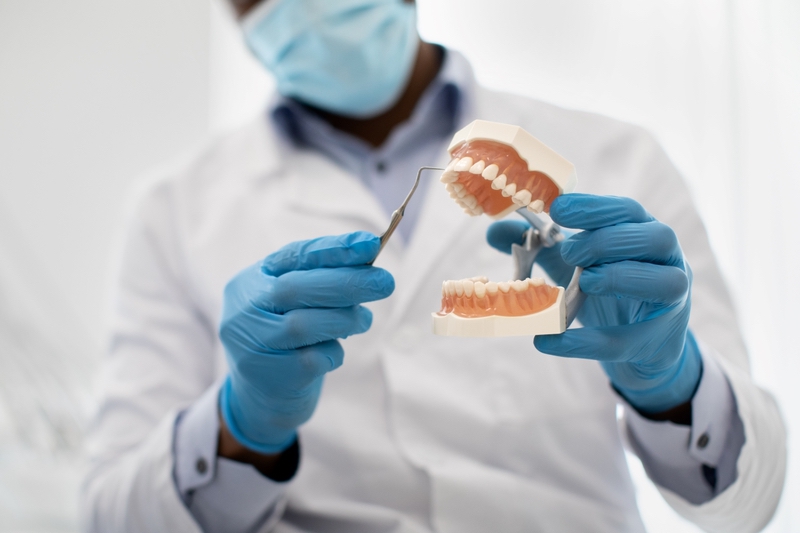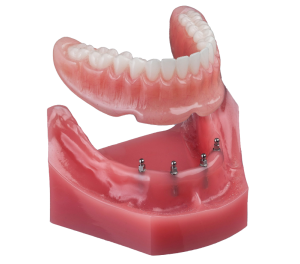What is Denture Stabilization?
Overview of Denture Stabilization
Denture stabilization uses dental implants to keep dentures securely in place. This treatment is ideal for patients with loose or uncomfortable dentures. Implants are placed into the jawbone, enhancing denture retention and providing a more secure fit.
How Does Denture Stabilization Work?
Denture stabilization involves inserting dental implants into the jawbone. These implants act as anchors, offering support and stability for the dentures. Options include implant-supported dentures and mini dental implants. With this procedure, patients experience improved comfort and functionality.
Benefits of Denture Stabilization
Denture stabilization offers several benefits:
- Confidence: Secure dentures boost self-esteem.
- Chewing: Improved bite force aids in chewing food.
- Oral Health: Stabilized dentures enhance overall oral health.
- Smile: Enjoy a more confident smile.
- Comfort: Fixed dentures reduce discomfort and improve fit.
Types of Dentures
Traditional Dentures vs. Implant-Supported Dentures
Traditional dentures rest on the gums and are removable, while implant-supported dentures are anchored to implants in the jawbone. Implant-supported dentures provide better fit and stability. They do not rely on denture glue, offering more reliable stability.
What Are Mini Dental Implants?
Mini dental implants are smaller than regular implants but serve the same purpose. They support dentures, especially when bone density is low. These mini implants offer a less invasive option for denture stabilization systems.
Which Type of Denture Is Best for You?
Choosing between dentures and implants depends on individual needs. Consult a dentist to determine the best option based on your oral health and preferences. The right choice can improve the effectiveness of dental adhesives and ensure optimal comfort and stability.
The Process of Denture Stabilization
Preparation and Planning
A dental professional, such as a prosthodontist, conducts a thorough evaluation before placement. This includes consultations, pre-implant evaluations, and detailed dental planning to ensure accurate fitting for dentures.
How Are Dental Implants Placed for Stabilization?
Implants are surgically placed into the jawbone, beneath the gum tissue. This process involves anchoring the implant and allowing it to integrate with the bone, creating a stable base for the denture.
What to Expect During Your Procedure
Patients can expect several steps during the procedure, including anesthesia, implant placement, and recovery. Pain management and post-surgery recovery plans are discussed with the dentist to ensure a smooth process.
Who Needs Denture Stabilization?
Denture stabilization is essential for patients experiencing issues like gum disease and tooth wear. Ideal candidates include those struggling with denture fit, bite stability, and retention. Implant-supported dentures can significantly enhance a patient’s oral health and chewing efficiency.
Identifying Candidates for Denture Stabilization
Candidates for denture stabilization often battle gum disease, tooth wear, or poor denture fit. If a patient’s oral health is compromised or if dental implants are considered, stabilization might be necessary to improve comfort and functionality.
Can Denture Stabilization Improve My Quality of Life?
Yes, denture stabilization can drastically improve your quality of life by enhancing chewing efficiency and bite stability. Patients often report improved confidence and oral health, experiencing better denture retention and a more comfortable fit.
Am I a Good Candidate for Implant-Supported Dentures?
Implant-supported dentures are ideal for candidates looking for long-lasting solutions. If dental implants are feasible and your denture fit and bite stability are concerns, consult with your dentist to assess your oral health and suitability.
Care and Maintenance of Stabilized Dentures
Proper denture care and maintenance are crucial for longevity. Stabilized dentures paired with dental implants require regular cleaning and check-ups to prevent gum disease. Utilize dental adhesives and soft liners to maintain oral health and comfort.
Daily Care Routine for Stabilized Dentures
- Clean Daily: Brush dentures like natural teeth to remove plaque.
- Adhesives: Apply dental adhesives for added stability.
- Soft Liners: Use soft liners for enhanced comfort.
Maintaining a consistent routine ensures optimal denture performance and oral health.
How Often Should I Visit the Dentist?
Regular dentist visits—ideally every six months—are crucial for maintaining oral health. These check-ups allow for professional denture cleaning, adjustments, and early detection of any potential issues.
Tips for Long-Lasting Denture Stabilization
- Adhere to Maintenance: Regularly clean and check your dentures.
- Quality Adhesives: Use high-quality denture adhesives.
- Fit Adjustments: Ensure your denture fit is regularly assessed by your dentist.
Potential Challenges and Solutions
Facing challenges with denture stabilization? Common issues like denture discomfort and gum irritation can be mitigated through proper care and adjustments.
Common Issues with Denture Stabilization
Common problems include gum irritation and poor denture fit. If your dental implants are causing discomfort, it’s vital to address these issues promptly to protect your oral health.
How to Handle Denture Discomfort?
Address denture discomfort by:
- Adjustments: Ensure proper denture fit adjustments.
- Soft Liners: Utilize soft liners for added comfort.
- Pain Relief: Seek products specifically designed for denture pain relief.
What If I Experience Gum Irritation?
If you experience gum irritation:
- Consult Your Dentist: Immediate attention is necessary.
- Assess Fit: Check if your denture fit needs adjustments.
- Use Soft Liners: Soft liners can significantly relieve irritation.
By following these guidelines, you can ensure your stabilized dentures remain comfortable and effective. For personalized advice, don’t hesitate to contact Johnstown Dental Care.
Costs and Financing Options
How Much Does Denture Stabilization Cost?
Denture stabilization costs can vary widely depending on the method used. Many patients find that dental implants, commonly utilized for stabilization, are a significant investment in their dental care. Without insurance, these costs can range from $1,500 to $6,000 per implant. Consult with your dentist to get a personalized estimate based on your unique needs. Insurance may cover part of the cost, so check your policy details.
Are There Financing Options Available?
Yes, financing options are often available to help manage the cost of denture stabilization. Many dental care providers offer payment plans that allow patients to spread the expense over several months or years. This can significantly ease the financial burden. Additionally, some insurance plans may cover portions of the cost. Discuss specific options with your dentist and insurance provider to understand all available financing possibilities.
Will My Insurance Cover Denture Stabilization?
Insurance coverage for denture stabilization varies. Some policies include partial coverage for dental implants, while others do not. Review your insurance policy carefully and consult with your insurance provider to understand your coverage. Your dentist or dental care provider can also help navigate these details to maximize your benefits.
Alternatives to Denture Stabilization
Exploring Other Dental Stabilization Methods
There are several dental stabilization methods available aside from traditional implants. Options include removable dentures with adhesive, soft liners for extra comfort, and other dental stabilizers designed for improved fit and function. Each method has its own set of benefits and drawbacks. Discuss these alternatives with your dental professional.
What Are the Pros and Cons of Different Stabilization Options?
Different stabilization options come with their own pros and cons:
- Traditional Dentures: Affordable but may lack stability.
- Implant-Supported Dentures: Offer excellent stability but come at a higher cost.
- Mini Dental Implants: More affordable than full implants but may not be suitable for all patients.
- Dental Adhesives and Soft Liners: Improve the fit of removable dentures but may require frequent application and maintenance.
Consult with your dentist to choose the most appropriate solution.
Choosing the Right Provider
What to Look for in a Dental Professional
When choosing a dental professional for denture stabilization, look for extensive experience and credentials in prosthodontics. A specialist’s expertise ensures you receive quality care tailored to your needs. Patient reviews and recommendations can provide valuable insights into the dentist’s competence and approach.
How to Find an Experienced Prosthodontist?
Finding an experienced prosthodontist involves researching their background, expertise, and credentials. Check for board certifications and memberships in professional organizations. Consult with your current dental care provider for referrals, and consider patient testimonials to gauge satisfaction and quality of care.
Why Choose Johnstown Dental Care for Your Denture Stabilization Needs?
Johnstown Dental Care stands out for its expertise in denture stabilization. Our highly experienced team offers personalized care tailored to each patient’s needs. With a commitment to excellence and a patient-centric approach, we ensure you receive the best possible care for your dental health.
For more personalized advice and detailed consultation, contact Johnstown Dental Care today.
Key Insights
- We offer advanced denture stabilization treatments to ensure secure and stable dentures. Our solutions include the best denture stabilizers and flexible dentures for optimal comfort.
- Our denture stabilization systems feature options like supported dentures, snap-in dentures, and All-on-4 implants. These are tailored to meet both upper and lower denture stabilization needs.
- For those interested in cosmetic dentistry, we provide services such as dental crowns, orthodontics, and dental rehabilitation to enhance your smile and oral health.
- We specialize in relining, bone grafting for dentures, and denture realignment to maintain denture retention and stability.
- Understanding the risks and benefits is crucial. Our expert team, including DMD and DDS professionals, ensures you receive informed care.
- We use precise techniques and tools such as precision attachments, denture cushions, and denture suction solutions to alleviate denture pain and improve support.
- Our blog offers insights on topics like denture maintenance, the fitting process, and managing mouth sores from dentures, helping you stay informed and confident in your dental care journey.


